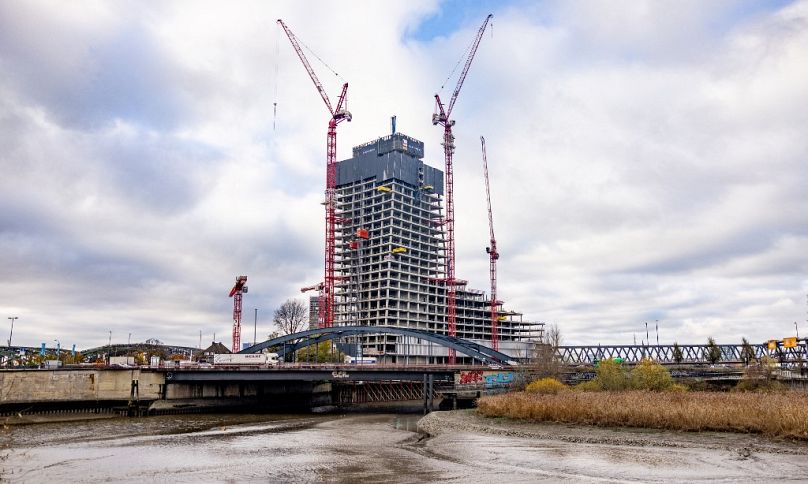The German economy faces an uphill challenge as recent economic data has revealed that its health is dependent on a few pending factors, Osama Rizvi writes.
Germany’s economy continues to remain under pressure as indicated by recent economic data with its gross domestic product (GDP) shrinking on Friday and its manufacturing sector still in contraction territory.
However, the global Purchasing Managers’ Index (PMI) data for the country, which summarises whether market conditions are expanding, staying the same, or contracting, came in at 47.1 in November — up from October's 45.9 and the highest since July.
However, as the PMI number is under 50, in the world of economics, it means a sign of contraction — and for Germany, it is the fifth consecutive month in the sub-50 contraction territory, symptomatic of an impending recession.
Moreover, significant declines in residential constructions and new orders, along with a drastic fall in affordability, are major challenges for the economic powerhouse of Europe, and it will continue to face these headwinds moving into 2024.
The residential construction sector in Germany in October showed an increase in the number of cancellations as 22.2% of companies cancelled projects, according to data from the economic institute IFO. It marks the largest increase since 1991.
Why is this happening? This is due to the global macroeconomic climate with rising debt levels and G7 countries tightening lending standards with many central banks putting interest rates higher for longer, which combined is not a very conducive environment for growth.
If this trend exacerbates, consumers will face further pressure on their incomes moving into the new year.
New construction orders and soaring cost of materials
We can also see that new orders for construction have been declining with companies reporting that the fall in orders increased from 46.6% in September to 48.7% in October — for context, it was only 18.7% in October 2022, a whopping 166% year-over-year increased drop in orders.
In Germany, the construction sector contributes 6% to the country’s GDP and one in 10 jobs, and accounts for a fifth of total output.
It is instructive to mention here that after the COVID-19 pandemic, when the money supply was at its peak, and interest rates extremely low, billions of euros were injected into this sector resulting in overpriced valuations with house prices rising 66%.
Interestingly, construction activity/output rose by 16% between 2015 to 2022.
The price of raw materials is 40% more expensive than they were before COVID-19 and interest rates have been hiked 10 times by the European Central Bank (ECB) resulting in a fall not only in the purchasing power of the consumer but also impacting their confidence with soaring inflation.
Meanwhile, the President of BaFin, which supervises around 1,740 banks and 674 financial services institutions in Germany, recently warned lenders who have large exposure to commercial real estate that he expects valuations to fall even further.
German retail giant Adler Group SA is already reeling under an immense debt burden — and the construction of Elbtower in Hamburg was recently halted due to the builder not paying with the total cost of it standing at €1.3 billion.
Another tell-tale sign of some structural weaknesses in the German economy is that not even a single new railway project got the green light in 2023.
Budget crisis and funding innovation
Moreover, the Organisation for Economic Co-operation and Development (OECD) warned on 23 November that Germany's budget crisis, which has called into question billions of euros in planned spending, could hamper the European economy over the next few years.
As Robert Grundke, the head of the OECD's Germany desk, explained, "If there is less investment and spending in Germany over the next few years because there is less money available, this will inevitably have an impact on the EU economy."
If you are wondering what the future holds, a recent report by the German Council of Economic Experts might be a good place to look too. According to the report, the country will only recover slightly in 2024 as its GDP is poised to contract by 0.4% in 2023.
Also, as long as the war in the Middle East continues, the prospects of another energy crisis in Europe, despite the inventories being 99% full, cannot be ruled out.
Germany’s energy-intensive industry has already registered a decline in output, falling 17% below where it was at the start of 2022. A further increase in energy prices can exacerbate this.
The construction sector activity and other economic indicators spell trouble for the German economy. However, a sudden shift in the central bank policies and/or global economic sentiment could turn the tide. Until then, consumers and investors will have to abide by the principle of cautious optimism.
Osama Rizvi is an economic and energy analyst with a focus on commodities, macroeconomy, geopolitics, and climate change.
At Euronews, we believe all views matter. Contact us at view@euronews.com to send pitches or submissions and be part of the conversation.




